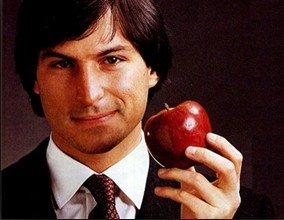Jobs was the public face of the IPO, and he helped choose the two investment banks handling it: the traditional Wall Street firm Morgan Stanley and the untraditional boutique firm Hambrecht & Quist in San Francisco. “Steve was very irreverent toward the guys from Morgan Stanley, which was a pretty uptight firm in those days,” recalled Bill Hambrecht. Morgan Stanley planned to price the offering at $18, even though it was obvious the shares would quickly shoot up. “Tell me what happens to this stock that we priced at eighteen?” Jobs asked the bankers. “Don’t you sell it to your good customers? If so, how can you charge me a 7% commission?” Hambrecht recognized that there was a basic unfairness in the system, and he later went on to formulate the idea of a reverse auction to price shares before an IPO.
乔布斯是此次IPO的公众形象,他也帮助挑选了负责IPO的两家投资银行:一家是传统的华尔街公司摩根士丹利,另一家是旧金山的汉布里克特-奎斯特(Hambredit&Quist),这并不是一家传统的投行,当时的服务只针对部分领域。“摩根士丹利当时是极端保守的公司,史蒂夫对他们公司的人十分无礼。”比尔·汉布里克特(BillHambrccht)回忆说。尽管苹果的股禀必然会迅速暴涨,但摩根士丹利计划将股价定为每股18美元。“我们把这只股票定价为18美元,接下来会怎么样?”他问那些银行家,“你们难道不会把这只股票卖给你们的优质客户吗?如果卖的话,那你怎么可以收取我7%的佣金?”汉布里克特意识到,体系中存在着基本的不公平,他提出了自己的想法:在IPO之前,通过反向竞拍来为股票定价。
Apple went public the morning of December 12, 1980. By then the bankers had priced the stock at $22 a share. It went to $29 the first day. Jobs had come into the Hambrecht & Quist office just in time to watch the opening trades. At age twenty-five, he was now worth $256 million.
苹果公司在1980年12月12日的早晨上市了。银行家们最终定下的股价是22美元一股。当天收盘时,股价已经涨到了29美元。乔布斯赶到汶布里克特-奎斯特的办公室,观看了开市。在25岁这一年,他的身家达到了2.56亿美元。
Baby You’re a Rich Man
上市 名利双收 老兄,你发财了!
Before and after he was rich, and indeed throughout a life that included being both broke and a billionaire, Steve Jobs’s attitude toward wealth was complex. He was an antimaterialistic hippie who capitalized on the inventions of a friend who wanted to give them away for free, and he was a Zen devotee who made a pilgrimage to India and then decided that his calling was to create a business. And yet somehow these attitudes seemed to weave together rather than conflict.
在史蒂夫·乔布斯的一生中,他贫穷过,也富裕过;既做过亿万富翁,也尝过破产的滋味,所以他对待财富的态度是很复杂的。他是个反对物质主义的嬉皮士,但他把朋友准备免费送出的发明转化成了获利的工具;他是佛教禅宗的狂热信徒,在印度进行过朝圣之旅,但之后又认定创业才是自己的使命。然而,很奇怪的是,这些特性在他身上并没有彼此矛盾,而是完美交织在了一起。
He had a great love for some material objects, especially those that were finely designed and crafted, such as Porsche and Mercedes cars, Henckels knives and Braun appliances, BMW motorcycles and Ansel Adams prints, B?sendorfer pianos and Bang & Olufsen audio equipment. Yet the houses he lived in, no matter how rich he became, tended not to be ostentatious and were furnished so simply they would have put a Shaker to shame. Neither then nor later would he travel with an entourage, keep a personal staff, or even have security protection. He bought a nice car, but always drove himself. When Markkula asked Jobs to join him in buying a Lear jet, he declined (though he eventually would demand of Apple a Gulfstream to use). Like his father, he could be flinty when bargaining with suppliers, but he didn’t allow a craving for profits to take precedence over his passion for building great products.
他对一些实体物质有着强烈的喜好,尤其是那些设计优雅、工艺精湛的物品,比如保时捷和奔驰汽车、双立人刀具和博朗电器、宝马摩托车和安塞尔·亚当斯(AmelAdams)的摄影作品、贝森朵夫(Bdsendorfer)钢琴和邦·奥陆芬(Bang&Olufsen)的音响设备。但不管多么富有,乔布斯居住的房子从来都是朴实低调的,家中摆设之简单,即便一个震颤教①的教徒看了也会自惭形秽。他出行的时候从不会有浩浩荡荡的随行人员,他也没有个人助理,甚至从未雇过保镖。他买下一辆豪华轿车,但从来都是自己开。马库拉邀他一起买里尔(Lear)喷气式飞机的时候,他拒绝了(不过后来他要求苹果公司给他购置了一架湾流飞机)。和自己的父亲一样,乔布斯在和供应商讨价还价的时候也十分坚定,但他不允许对利润的追求凌驾于他对制造伟大产品的狂热之上。
Thirty years after Apple went public, he reflected on what it was like to come into money suddenly:
在苹果公司上市30年后,他回顾了当年一夜暴富的感受:
I never worried about money. I grew up in a middle-class family, so I never thought I would starve. And I learned at Atari that I could be an okay engineer, so I always knew I could get by. I was voluntarily poor when I was in college and India, and I lived a pretty simple life even when I was working. So I went from fairly poor, which was wonderful, because I didn’t have to worry about money, to being incredibly rich, when I also didn’t have to worry about money.
我从来没有为钱担心过。我成长在一个中产阶鈒家庭,所以我从没担心过会挨饿;我在雅达利公司的时候,意识到自己是个还不错的工程师,所以我知道自己肯定可以维持生计;我读大学和在印度的时候,自己选择了过苦日子,后来尽管我开始工作了,但我还是过着十分简单的生活。我经历过极度贫穷,那种感觉很美好,因为我不用为钱担忧,后来我变得特别有钱了,还是不用为钱担心。
I watched people at Apple who made a lot of money and felt they had to live differently. Some of them bought a Rolls-Royce and various houses, each with a house manager and then someone to manage the house managers. Their wives got plastic surgery and turned into these bizarre people. This was not how I wanted to live. It’s crazy. I made a promise to myself that I’m not going to let this money ruin my life.
我看到苹果公司的一些人,大赚一笔后就觉得自己要过不同的生活。他们买下劳斯莱斯汽车和许多房子,每所房子都有管家,然后再雇一个人管理所有的管家。他们的妻子去做整形手术,把自己变得稀奇古怪。这不是我想要的生活方式。这太疯狂了。我答应过自己,不会让钱级了我的生活。












